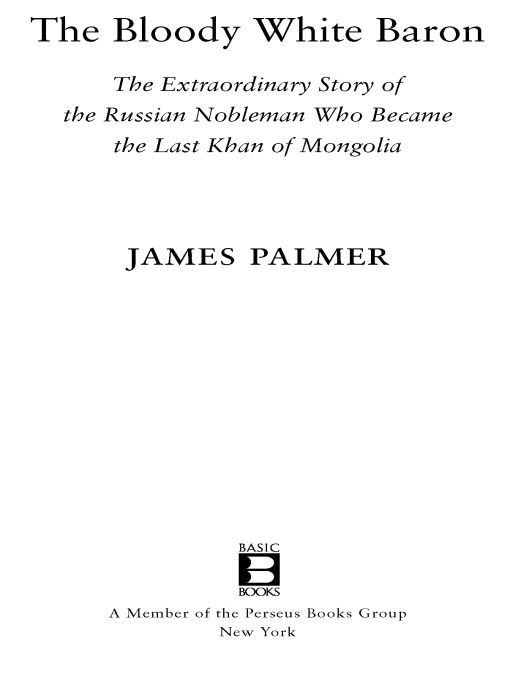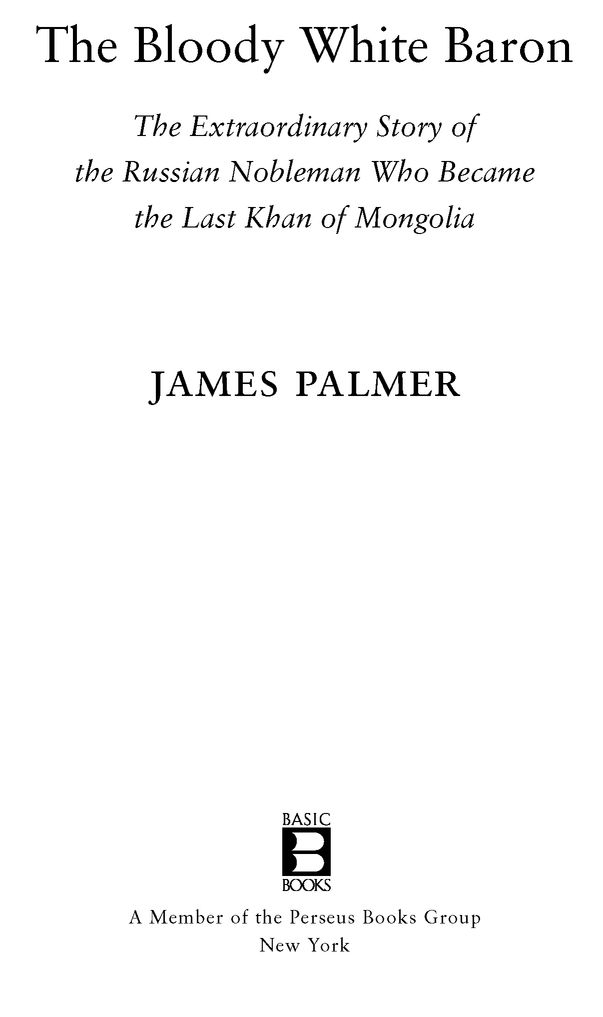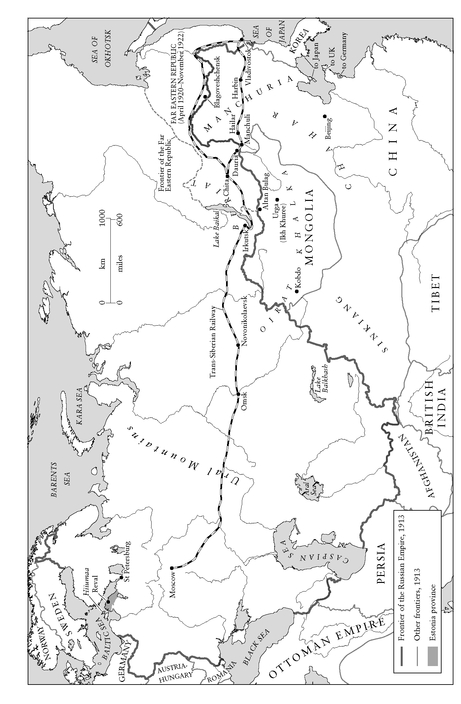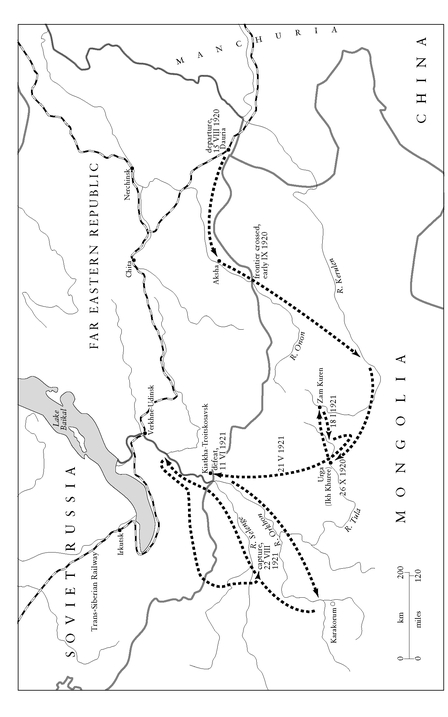The Bloody White Baron
Read The Bloody White Baron Online
Authors: James Palmer


Table of Contents
Â
Â
Â

For my mother and father
Acknowledgements
Thanks go first of all to Colin Thubron, who both encouraged me to propose the book in the first place and said ridiculously kind and reassuring things about my writing. My father, Martin Palmer, read and criticised the book at all stages, as well as supporting me through the inevitable financial travails of roaming across Asia; my mother, Sandra Palmer, provided an English home base filled with love and encouragement in those travels. Vicki Finlay helped greatly with the proposal and provided tips on dealing with the publishing process.
Neil Belton improved this book immensely through his careful and intelligent editing, as did Henry Volans. Trevor Horwood's thoughtful and detailed copy-editing was a pleasure to endure and András Bereznay tracked down even the most obscure Mongolian towns for the maps. Many thanks also go to my agents, Gillon Aitken and Jon Jackson.
Willard Sunderland suggested Russian materials, read and criticised the manuscript and caught several important errors; I owe a great debt to his scholarly generosity, and am greatly looking forward to reading his own book on Ungern. Jamie Bisher's
White Terror
was an invaluable source for information on Semenov and the Whites in Siberia, and his enthusiasm and kindness in providing further information an inspiration. My debt to the collections of materials and documents on Ungern compiled by S. L. Kuzmin is immense.
White Terror
was an invaluable source for information on Semenov and the Whites in Siberia, and his enthusiasm and kindness in providing further information an inspiration. My debt to the collections of materials and documents on Ungern compiled by S. L. Kuzmin is immense.
Tjalling Halbertsma, Machiavelli of the steppe, encouraged me to come to Mongolia; Guido Verboom provided a warm welcome when I was there. âJack' drove me around the country in a beaten-up taxi that really shouldn't have gone as far as it did. Urantsatsral Chimedsengee
was an excellent translator, as was Anna. Shamefully, I have lost the name of my excellent half-Buriat translator and guide.
was an excellent translator, as was Anna. Shamefully, I have lost the name of my excellent half-Buriat translator and guide.
My friend Christiane Mackenzie died the year before I started working on the book, after a long and loving correspondence in which she never stopped pushing me to write; her last letter to me was titled âMongolia'. Arthur Hertzberg taught me that all good books stem from obsession. Olga Bryskine tried to introduce me to Russian many years ago; it wasn't her fault that I was more interested in her than the language. Che Yiping made living in a dust-filled provincial city in Hebei a positive joy; so, in
very
different ways, did George Dent and Ian Sherman.
very
different ways, did George Dent and Ian Sherman.
I'd also like to thank James and Allison Holloway, Julia von dem Knesebeck, Evgenie Medvedev, Sergei Bojalensky, Christopher Kaplonski, Nicholas Goodrick-Clarke, Nick Middleton, Jasper Becker, Tom McGrenery, Professor Khisight, Thierry Michel, Gareth Hanrahan, Elizabeth and Scott Akehurst-Moore, my aunts Roxie, Ralou, Sheila and Yan Chi, my uncle Nigel, my aged grandsire Rudolf Fischer and his wife Dagmar, all of whom gave advice, commentary, or support, as well as many others who provided hospitality or directions in Russia, Mongolia and Estonia.
My girlfriend, Claudia He, put up with my wandering about Mongolia and Russia from the very start of our relationship three years ago, and kept a loving home in Beijing for me when I came back. She insisted, out of a Confucian sense of filial piety, that this book be dedicated to my parents alone; the next one is just for her.
Maps

The Russian Empire and her ncighbours, 1913

Ungern's movements in Mongolia
Introduction
My name is surrounded with such hate and fear that no one can judge what is the truth and what is false, what is history and what myth.
BARON UNGERN-STERNBERG, 1921
Â
I imagine that he would like to be remembered riding through a horde of terrified revolutionary soldiers, scything them down with his sabre as bullets whizzed around him, passing through his cloak, but never so much as scraping him; the warrior-king of Mongolia, receiving reports, tribute and prisoners, like his hero Genghis Khan, in a hastily pitched campaign tent. My chief image of him, though, is less heroic; I picture him on the steps of a temple, hearing - and believing - that he has only a hundred and thirty days left to live, his mutilated face suddenly contorted by terror.
This book tells the story of Freiherr Roman Nikolai Maximilian von Ungern-Sternberg, the last khan of Mongolia, who in one short year rose from being a Russian nobleman to incarnate God of War and returned Khan. In Mongolia he was lauded as a hero, feared as a demon and, briefly, worshipped as a god.
I first stumbled upon his story in one of Peter Hopkirk's brilliant accounts of central Asian espionage,
Setting the East Ablaze
. In late 1920 a White Russian baron and cavalry major-general, thin, intense and hideously scarred, had cut his way into Mongolia, defeated the Chinese occupiers, taken over the country, ruled it briefly and brutally, and raised a Mongolian army to lead back against Russia.
Setting the East Ablaze
. In late 1920 a White Russian baron and cavalry major-general, thin, intense and hideously scarred, had cut his way into Mongolia, defeated the Chinese occupiers, taken over the country, ruled it briefly and brutally, and raised a Mongolian army to lead back against Russia.
It could have been just another bloody episode in the long horror of the Russian Civil War, but what made it unusual was the sheer
oddness of Ungern-Sternberg. Most of the Russian leaders, whether the Bolshevik Reds or their opponents the Whites,
1
were a vicious bunch who were not averse to the slaughter of a few thousand citizens, the Reds in the name of the people, the Whites in the name of the tsar, but none of the others did it in the name of Buddha. According to his Russian companions, Ungern-Sternberg was a pious, if unorthodox, Buddhist, and he lived in a world of gods and prophecies that contrasted starkly with the one inhabited by most of his contemporaries. He had not seized Mongolia out of a grand strategic plan, but because, it was claimed, he believed himself to be the returned Genghis Khan, flail of the Bolshevik unbelievers and head of an empire that would stretch from China to the Urals.
oddness of Ungern-Sternberg. Most of the Russian leaders, whether the Bolshevik Reds or their opponents the Whites,
1
were a vicious bunch who were not averse to the slaughter of a few thousand citizens, the Reds in the name of the people, the Whites in the name of the tsar, but none of the others did it in the name of Buddha. According to his Russian companions, Ungern-Sternberg was a pious, if unorthodox, Buddhist, and he lived in a world of gods and prophecies that contrasted starkly with the one inhabited by most of his contemporaries. He had not seized Mongolia out of a grand strategic plan, but because, it was claimed, he believed himself to be the returned Genghis Khan, flail of the Bolshevik unbelievers and head of an empire that would stretch from China to the Urals.
It was an almost unbelievable story. One of his chief war aims was to free the Bogd Khan, the huge, blind Living Buddha who had been imprisoned by the Chinese, so that he could act as a rallying point for his crusade. Like all good conquerors, he was rumoured to have left hidden treasure behind him, plundered from monasteries and buried somewhere on the steppe. Ungern-Sternberg did not seem to belong to a century of tanks and telephones but to an earlier, cruder age. Like his Baltic forefathers, he was a lost crusader, a bloody-handed pillager driven by both an intense religious fanaticism and devotion to the joy of slaughter. His hatred was focused, though: Jews and Bolsheviks were killed by his troops on sight, presaging a later, greater evil.
His adventures were made all the stranger by their location. Mongolia can sometimes seem half-imaginary, a storybook country that has no business being real. Most countries project their own mental image, however muddle-headed or stereotypical: skyscrapers and hamburgers, berets and the Eiffel Tower, the willow pattern and the Great Wall, bowler hats and big red buses. Mongolia's popular images are emptiness and exile; Outer Mongolia is a metaphor for as far from anywhere as you can be. When the current president of Mongolia, Enkhbayar, came to England to study as a young man, he was detained by a sceptical immigration official who refused to believe that Mongolia was a real country - âYou're having me on, son' - until Enkhbayar produced an atlas to prove his homeland's reality.
There was a time, though, when the Mongols ruled the world, or at least a substantial chunk of it. Under Genghis Khan (1162-1227),
arguably the most successful conqueror in history,
2
the Mongols were transformed from a group of infighting backward steppe tribes to become the masters of Asia, a ruthless, streamlined war machine whose speed, force and flexibility massively outclassed any other army of the era. By the time of Ungern's invasion, however, the Mongol Empire had long collapsed, swallowed up by Russia and China, once again a collection of scattered and feuding clans. They left behind them deep cultural memories of massacred peoples and burnt-out cities.
arguably the most successful conqueror in history,
2
the Mongols were transformed from a group of infighting backward steppe tribes to become the masters of Asia, a ruthless, streamlined war machine whose speed, force and flexibility massively outclassed any other army of the era. By the time of Ungern's invasion, however, the Mongol Empire had long collapsed, swallowed up by Russia and China, once again a collection of scattered and feuding clans. They left behind them deep cultural memories of massacred peoples and burnt-out cities.
Tolstoy, writing gloomily of the brutalities of the tsarist system in the nineteenth century, feared the onset of âGenghis Khan with the telegraph',
3
and perhaps a greater soldier could have made something of the combination of Mongol ferocity and modern strategy. Ungern was not that man. His agenda was set by the rantings of shamans and his chaotic dreams, not by railway timetables or quartermasters' reports. How, I thought, do you come to behave like this? How does a Baltic-Russian aristocrat end up a fanatical Buddhist?
3
and perhaps a greater soldier could have made something of the combination of Mongol ferocity and modern strategy. Ungern was not that man. His agenda was set by the rantings of shamans and his chaotic dreams, not by railway timetables or quartermasters' reports. How, I thought, do you come to behave like this? How does a Baltic-Russian aristocrat end up a fanatical Buddhist?
And yet, there seemed to be more to his leadership than sheer despotic terror. He was undoubtedly popular among his Mongolian troops, who fought for him with a fury which appeared to some European observers to be close to devil-worship. Everything about the story seemed uncertain, even Ungern's appearance, tall in some sources, short in others, grey-eyed, green-eyed, blue-eyed - nobody was able to pin him down. In one account he came across as a detached fanatic, willing to muse on philosophy and history, in another as a sadist and butcher, hands steeped in blood. Stories about him were a morass of rumour, myth and supposition. His personal beliefs were murky; his Buddhism might have been inherited from an equally eccentric grandfather, or the result of a personal conversion during his early years in Mongolia, and he seemed happy to use the most respectable, if mystical and apocalyptic, language of Russian Orthodoxy at points, despite his family being Lutheran. The changes in his appearance suggest an atavistic religious progress. In one of the few surviving photographs he appears in Russian army uniform, neatly groomed, but with an intense, monastic appearance, like an Orthodox mountain hermit, but near the end of his campaign he rode bare-chested, âlike a Neanderthal', hung with bones and charms, his beard sprouting in
all directions and his chest smeared with dirt. He had gone from monk to shaman in a few years.
all directions and his chest smeared with dirt. He had gone from monk to shaman in a few years.
Other books
Raven by Ashley Suzanne
Into the Darkness by Harry Turtledove
The Knight and The Healer: A Medieval Romance by Benson, Lorna
The Best American Mystery Stories 2015 by James Patterson, Otto Penzler
She Painted her Face by Dornford Yates
Smitten by Janet Evanovich
Tea-Totally Dead by Girdner, Jaqueline
Devil's Keep by Phillip Finch
The Price of Indiscretion by Cathy Maxwell
